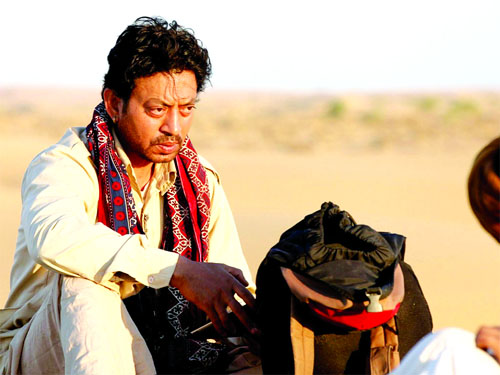Saibal Chatterjee
Cast: Irrfan, Jimmy Shergill, Tushar Dalvi,
Vishesh Bansal, Uday Tikekar
An unusual plot and a consistently dazzling pivotal performance from Irrfan give Madaari its edge, but nothing that the storyline and the actor bring to the table can prevent the film from being disappointingly underwhelming.
Madaari revolves around a cat and mouse game between a common man driven to despair and an entire security set-up bent upon rescuing the Union home minister’s kidnapped son.
On paper, the film appears to possess the raw material that is needed to build up a convincing tale of an underdog striking back when the system fails him.
But director Nishikant Kamat fails to deliver the knockout punches that could have added up to edge-of-the-seat and thought-provoking entertainment
Madaari opens with a kidnap. A man with long hair and a flowing beard, Nirmal Kumar (Irrfan), whisks away a Dehradun schoolboy Rohan (Vishesh Bansal).
The captor knows exactly who the boy is – his identity is a key part of the abductor’s plans – but the police force has no clue who the kidnapper is.
A discreet manhunt is launched to nab the man as he, along with the boy, makes his way across northern India, eluding the grasp of CBI official Nachiket Verma (Jimmy Shergill).
The home minister Prashant Goswami (Tushar Dalvi) is at the end of his tether, but given the sensitivity of the situation, he has to keep the mission low-key and under wraps.
Nirmal Kumar is an aggrieved soul, having lost his seven-year-old son in a bridge collapse in Mumbai. His anger is directed against the nation’s corrupt politicians, which explains why he targets a high-profile minister’s son.
But the kidnapper is anything but a criminal or a terrorist. So no matter how angry he gets, he does no harm to the boy.
But so obvious are Nirmal Kumar’s intentions from the very outset that Madaari never whips up any tension at all. It is a facile drama that banks upon irrational means to achieve its narrative ends.
Even as the film proffers bland, unexciting fare, Irrfan ensures that the proceedings do not turn overly pedestrian. Watching him emote is a treat – he captures a wide array of emotions, from the crushingly cynical to the gut-wrenchingly poignant – without missing a trick.
The other characters in the film – the sleuth played by Shergill and the minister essayed by Dalvi – have their moments but are confined within a limited ambit, reducing their impact.
The most ineffectual aspect of Madaari is the characterization of the kidnapped boy. At no point does he come across as overly vulnerable nor is his bonding with his captor ever fully substantiated.
Madaari loses its way in a welter of cliches about how the masses are always at the mercy of electoral politics and of those who control the strings of the government.
That apart, the solution that the protagonist advocates and puts into practice is a dangerous form of vigilantism that, if it were to spill into the real world, would only open a Pandora’s Box and worsen matters.
But for all its thematic and stylistic flaws, Madaari is never less than a passable film because Irrfan lends it both gravitas and energy.


